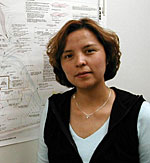By Tom Robertson
Minnesota Public Radio
May 15, 2002
Rural residents have complained for years about poor access to high speed Internet service. But the so-called "digital divide" in Minnesota may be a thing of the past. A recent survey of independent outstate telephone companies shows rural Minnesotans are now more likely to have access to high speed Internet than those in the Twin Cities. Rural phone companies have spent millions of dollars expanding their infrastructure. In the process, they've cut deep into territory once dominated by larger companies like Qwest Communications.
| |
|
|
|
||
There are places in rural Minnesota where just a few decades ago, people were lucky just to get basic telephone service. But things are changing. Companies like Paul Bunyan Telephone Cooperative in northern Minnesota are busy building state-of-the-art systems. And they're not just sticking to phone lines. They're offering digital television, too.
Paul Bunyan spokesman Brian Bissonette says it's happening not just in large communities, but in places not even on the map.
"It is quite remarkable and it is truly rural," says Bissonette. "I mean, you can go out to these places and you would not believe that these people can get high speed DSL Internet service and all-digital television service."
Paul Bunyan's expansion has turned the Red Lake Indian Reservation, for example, into one of the most technologically wired reservations in the country. The tribe says access to DSL, a high-speed, always-on Web connection, will boost their economic development opportunities. It's already changed the way Tribal Engineer Dionne Pete does business. She says she no longer worries about sending large files over the Internet.
"We were averaging like three days just to send a file, normally," she says. "And boy, we found ... from a three day to now shortened to maybe 15 minutes? To us, that's a tremendous productivity we found within our organization."
Paul Bunyan Telephone officials say they're able to deliver high tech services to very rural areas like Red Lake because of the cooperative's success in Bemidji. That city was once dominated by Qwest Communications. High speed internet access was non-existent.
But Paul Bunyan built its own network using the latest fiber optic technology. Company spokesman Bissonette says people were eager for high tech services. Paul Bunyan quickly took over the market.
"Three out of every four people that we've passed have switched to our service, which is phenomenal," he says. "Our business plan didn't call for us getting 75 percent of the customers, ever, to make it work."
The scenario is being repeated in Wilmar, Caledonia and other towns across the state. The Minnesota Association for Rural Telecommunications says in one year, high speed Internet access nearly doubled in areas served by independent phone companies. Randy Young is director of the association.
"I think in those communities where the incumbent or the existing telephone company is not putting in the technology that the community needs, we're going to see somebody come in and do it in a competitive basis," says Young.
Qwest is the dominant local phone company in Minnesota and more than a dozen other states. Some customers complain the company is too slow to upgrade its lines. Qwest admits it's losing rural customers. But the company blames what it calls an unfair system of federal subsidies. They say small rural telephone companies get help, but not Qwest.
Brice Hallowell, the company's regional spokesman, says what Qwest wants is government permission to offer long distance service. That way, they could bundle more services together, making rural Minnesota profitable.
"And that will save Minnesotans about $130 million annually on their phone bills," says Hallowell. "And it will change the dynamics for Qwest so that we are able to provide new packages and services and more broadband deployments across the state."
Independent telephone companies say 2001 showed the largest one-year expansion of advanced telecommunications infrastructure in state history. Observers say that growth rate is likely to level out. Qwest, meanwhile, is working to catch up. By the end of the year, Qwest will complete DSL upgrades in 13 Minnesota cities.

